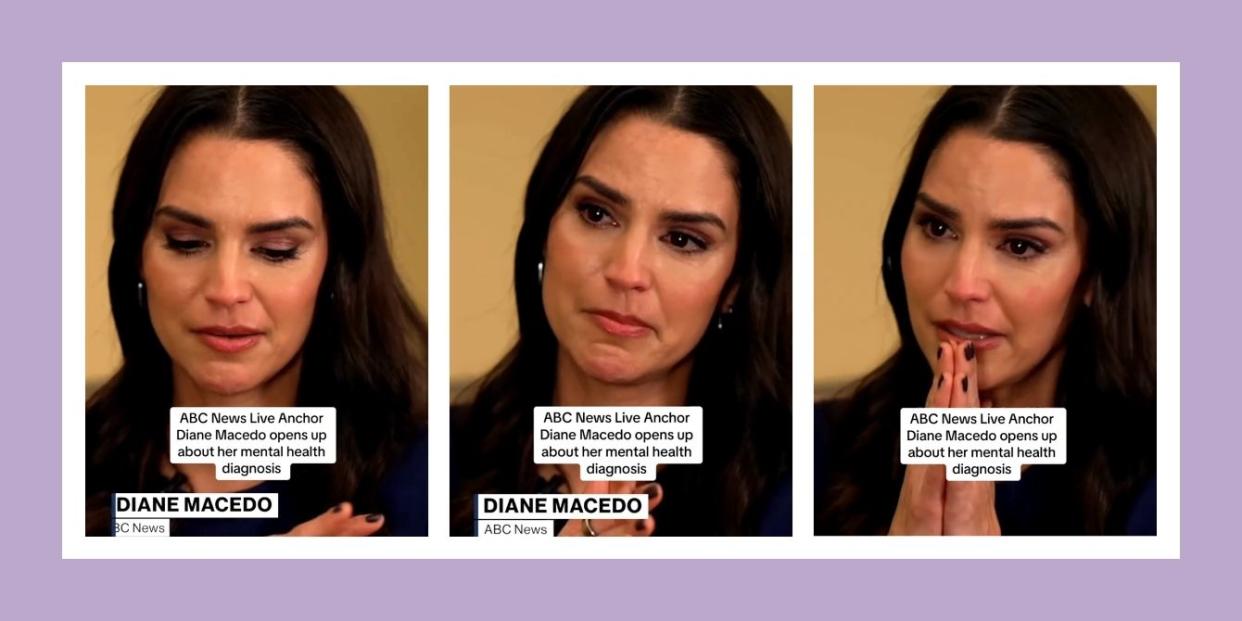ABC News anchor gets emotional about receiving her ADHD diagnosis later in life

If you scrolled through your social media feeds recently, you may have noticed an uptick of women announcing they have been finally diagnosed with ADHD—in fact, according to a 2023 study, the percentage of women newly diagnosed with ADHD between the ages of 23 to 29, and 30 to 49 years of age nearly doubled from 2020 to 2022. And we’re not seeing the rise of diagnosis in our peers just on social media, but from women in the public eye as well.
ABC News Live anchor Diane Macedo received her diagnosis in her 40s, and she spoke about it on Good Morning America. In an interview with PEOPLE, she shared, “I’m grateful to finally be diagnosed, even if [it is] this late in life, and it’s amazing to be able to troubleshoot obstacles that I always thought were character flaws.” Macedo added, “It not only changes how you do things, it changes how you view yourself.”
While on Good Morning America, Macedo said at the time of her diagnosis she was surprised, because doctors had always described ADHD symptoms as being rambunctious, not able to sit still, can’t study, etc. She was always an honors student and always excelled at work.
The nonprofit Children and Adults with Attention-Deficit/Hyperactivity Disorder (CHADD) reports that the bias about ADHD leaves many women getting diagnosed later in life. “Boys are still more likely than girls to be diagnosed with ADHD. This is due at least in part to the fact that one of its more visible symptoms, hyperactivity, is more common among boys. With fewer girls receiving a diagnosis, because they tend to have the predominantly inattentive presentation, many professionals fail to consider ADHD when those girls reach adulthood,” the nonprofit shared in an article.
The article also noted that most of the time, women go to a healthcare professional for ADHD symptoms, but receive the misdiagnosis of anxiety and depression. “Once a diagnosis of depression or anxiety is made, it is often the focus of treatment. Mental health providers are less likely to think of the depression or anxiety as having been brought on—at least in part—by the challenges of coping with undiagnosed ADHD,” according to the article.
And often, women don’t get diagnosed until after becoming a mom.
Macedo shared in a TikTok video that all of her coping mechanisms for her ADHD worked for her until she became a mom. “Now I have two kids and I love them dearly,” she said tearfully, “I really value my roles as being a wife and a mother, and I take those roles very seriously.”
“I find it very hard sometimes to manage all of that, and the expectations that I put on myself and I feel like I have to battle my brain while doing it all the time,” she concluded.
Receiving her diagnosis, even later in life, has been a positive change for Macedo. She told PEOPLE, “You paint a different picture of yourself and you realize, ‘Oh these aren’t character flaws. This isn’t that I need to try harder, it’s that my brain works differently.’”
“And knowing that helps you start to troubleshoot…‘Okay, why is this hard for me? Because I have a short term memory problem. What can I remember?’ And so it’s helped me change so many things,” she said.
There are many online quizzes available now that you can take if you suspect you have ADHD, and it’s always important to talk to your healthcare provider and encourage them to look deeper into your concerns if you feel like you’ve been improperly diagnosed with anxiety or depression and you think you may have ADHD. Getting that diagnosis can answer a lot of questions and start your path toward a better life.


